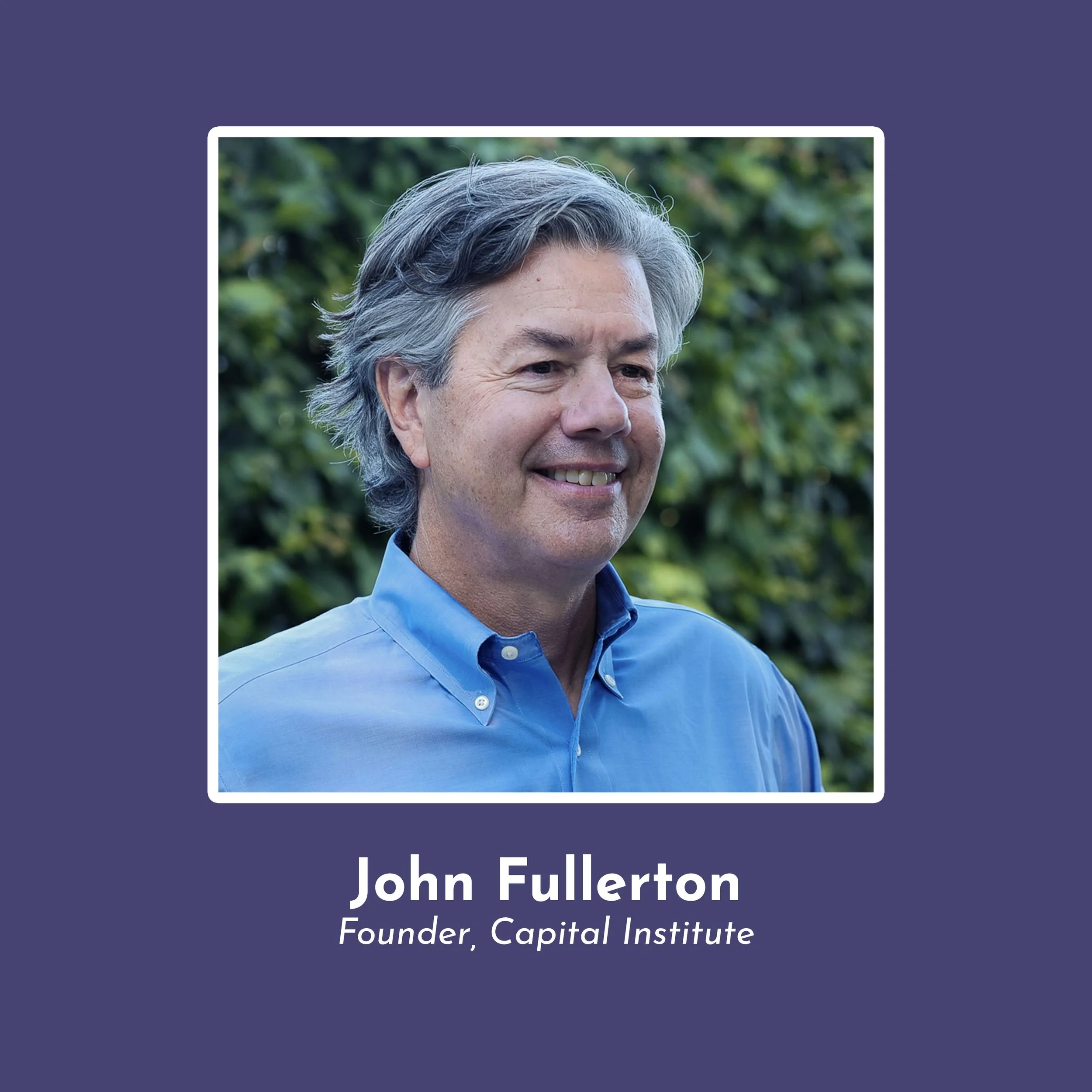John Fullerton: “Regenerative Economics: New Economic Paradigms, Living Systems, & Holistic Thinking”
Episode 149
November 6th, 2024
(Conversation recorded on October 10th, 2024)
Show Summary
Our modern economic system is designed to maximize financial capital, viewing money as though it were wealth itself. But what would happen if we viewed wealth more holistically, taking into account our natural, social, cultural, and human capital, too?
In this conversation, Nate is joined by unconventional economist John Fullerton to discuss the principles of regenerative economics and the need for shifts in our economic paradigms from reductionist thinking to holistic thinking. Fullerton emphasizes the importance of understanding economies as living systems, advocating for financial and monetary systems that align with the patterns of life.
If regenerative economics represents a societal shift towards sustainability, how does our modern financial system act as a barrier to that shift? If the ‘myth of separation’ contributes to our current economic problems, what types of radical change are needed to reconcile our values dissonance as our crises deepen and accelerate? Finally, how can we teach ourselves to differentiate between the real economy and the financial economy – and to value the things that genuinely add to human and planetary well-being?
About John Fullerton
John Fullerton is an unconventional economist, impact investor, writer, and some have said philosopher. Building on and integrating the work of many in the field of ecological economics, he is the architect of Regenerative Economics, first conceived in his 2015 booklet, “Regenerative Capitalism: How Universal Patterns and Principles Will Shape the New Economy.”
After a successful 20-year career on Wall Street where he was a Managing Director of what he calls “the old JPMorgan,” John listened to a persistent inner voice and walked away in 2001 with no plan but many questions. He went on to create The Capital Institute in 2010, which is dedicated to the bold reimagination of economics and finance in service to life. John is also the Chairman of New Day Enterprises, PBC, the co-founder of Grasslands, LLC, and a board member of both the Savory Institute and Stone Acres Farm.
Show Notes & Links to Learn More
00:00 - John Fullerton info, Capital Institute, Courses: Regenerative Economics + Regenerative Finance
03:43 - Walter Annenberg
07:26 - Avoiding cognitive dissonance: motivated reasoning + confirmation bias
10:55 - Prices are wrong
10:58 - The Economic Superorganism
11:20 - Regenerative Agriculture
11:52 - The Limits to Growth
12:55 - E.F. Schumacher, Herman Daly + TGS Episode, Peter Brown, Peter Victor
13:00 - Ecological Economics journal
15:22 - Allan Savory, Holistic Planned Grazing
15:51 - Grasslands LLC
18:12 - Humans appropriate *44% of Net Primary Productivity
18:50 - Gaia Theory, James Lovelock, Lynn Margulis
19:25 - The Universe as a living system
20:24 - Living Systems overview
21:4 - *254 million students are enrolled in universities
21:52 - The influence of Newtonian Physics on Classical Economics
22:15 - Impact of Newton on Biology
22:30 - Clockwork universe
22:47 - Irving Fisher, 1892 Dissertation
24:01 - William Nordhaus Nobel Prize paper
24:30 - Corey Bradshaw + TGS Episode
24:38 - The estimated impact of climate change scenarios on extinctions
26:31 - Integrating entropy into economics
27:02 - Daniel Schmachtenberger + Bend Not Break series, TGS Episode on Artificial Intelligence, TGS Episode on Naive Progress
31:12 - The 8 principles of a Regenerative Economy
31:53 - Jan Smuts, *Holism and Evolution, Einstein’s praise of Smuts
32:37 - Wes Jackson
33:00 - Reductionism
34:55 - The finger and the moon analogy
38:00 - Bioregionalism
42:29 - Overshoot
42:50 - Trees grow at *2.5% per year
44:00 - Planetary Boundaries
44:22 - Doughnut Economics, Degrowth
46:09 - Donella Meadows, the importance of the paradigm
48:23 - Carbon sequestration potential in soils + oceans + wetlands
49:47 - Maximum Power Principle
50:37 - *Mammal species have an average lifespan of 1-2 millions years
51:21 - The rise of the CFO
52:01 - Thorstein Veblen, The Theory of the Leisure Class
52:50 - For the Common Good pdf
52:44 - Chrematistics
59:54 - Robert Ulanowicz, resilience and efficiency graph Figure 1
1:01:23 - Financial overshoot and The Great Simplification
1:02:00 - Finance for a Regenerative World pdf
1:02:25 - Regenerative Finance (ReFi)
1:04:33 - Financial Transaction Tax
1:11:37 - Free Rider Problem
1:12:41 - Fritjof Capra + TGS Episode
1:16:05 - nRhythm
1:27:41 - 2022 Physics Nobel Prize
